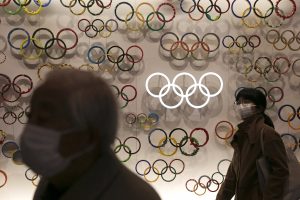With seven months remaining until the postponed Tokyo Summer Olympics, there is growing public skepticism over whether the global sporting event can be held as authorities struggle to clamp down on the explosion of COVID-19 infections across the country.
The Olympics have been cancelled, but never postponed before. In a New Year’s statement Prime Minister Suga Yoshihide said he is determined to host the games as a symbol of world unity. But COVID-19 cases in Japan show no signs of easing and the question remains how to host the Olympics safely.
A steady rise in infections since late November has brought Japan to over 300,000 cases nationwide with 97 daily deaths on January 13. In Tokyo, daily infections surpassed 2,000 for the first time on January 7, with a single highest daily figure of 2,447 cases and an average of 1,453 daily cases in the first week of January. Currently there are over 19,000 active cases in the capital.
Japan has expanded its second state of emergency to seven more prefectures – Osaka, Kyoto, Hyogo, Fukuoka, Aichi, Gifu, and Tochigi – after initially issuing restrictions for Tokyo and the neighboring prefectures of Chiba, Saitama, and Kanagawa on January 7.
Suga says he is committed to holding the Olympics safely and successfully, but the elephant in the room is the possible resurgence of the virus. Internationally there is a lot of hope riding on various COVID-19 vaccines. However, Japan’s vaccination program lags behind the United States, U.K., and Europe which have already begun administering shots. The Japanese government plans to roll out vaccines in late February and aims for a “sufficient” number of residents to be vaccinated by June, just one month prior to the start of the Olympics. Vaccinations for Olympic competitors won’t be mandatory but will be encouraged.
Japan is expecting the arrival of some 15,000 athletes in addition to thousands of media personnel, tournament volunteers, and foreign spectators. Olympic venue capacity and the number of spectators allowed to participate will be determined by March. However, simulation experts say even if daily infections fall below 500 by February 24 as a result of the state of emergency, new cases are predicted to skyrocket over 1,000 by mid-April. If new infections plummet to under 100, cases will return to the current level by mid-July – during the postponed Summer Olympics. To add to the grim forecast, according to data available on Worldometer, as of January 13 Japan’s PCR testing capacity was ranked 148th out of 220 countries with 5.3 million PCR tests having been conducted in Japan as of January 8 compared to 271 million in the United States as of January 11.
Public disapproval is growing over not only the new administration’s reactive approach to COVID-19 countermeasures but also the budget blowout. Japanese taxpayers have funded the most expensive Olympics in history. In 2013 when Japan won the bid to host the 2020 Olympic Games the total cost was estimated at 734 billion yen. The cost of the 2021 Olympics Games is now expected to reach between 3.5 trillion to 4.5 trillion yen ($33 billion to $43 billion), with 100 billion yen needed just for COVID-19 countermeasures such as spectator health inspections.
Amid growing calls to cancel from opposition parties, a NHK public opinion poll found that the number of respondents who believe the games “should be held” fell from 40 percent in October to 27 percent in December. Those who believe it should be postponed (again) rose from 23 percent in October to 32 percent in December.
Japan’s month-long state of emergency is focusing on containing virus hotspots in the hospitality industry with requests for restaurants and bars to shorten business hours and close at 8 p.m. The restrictions depend on voluntary cooperation and are not as comprehensive as the state of emergency in April, with schools remaining open. Many restaurants are now expecting a lunch rush instead of the usual dinner rush.
At a televised press conference Tokyo Governor Koike Yuriko warned that the “coronavirus doesn’t have a watch” and asked residents to refrain from going outdoors regardless of the time.
Over the three-day weekend following the state of emergency, shops were open as usual and there was no sense of crisis. NHK reported that the number of people out and about around Tokyo station as well as the commercial and entertainment district of Shinjuku was 2.5 times higher compared to the first weekend after last April’s emergency declaration.
The International Olympic Committee (IOC) has ruled out the possibility of postponing the Olympics for another year. Last month IOC President Thomas Bach said he is “very confident” Japan will hold a successful Olympics this year and has “full confidence in Japanese authorities.” But Bach said much the same early last March, only for the games to be postponed three weeks later.

































